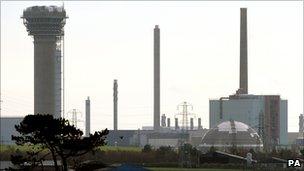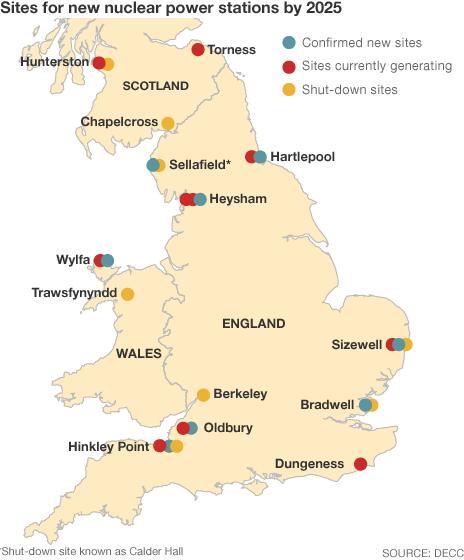New UK nuclear plant sites named
- Published
- comments

The Sellafield nuclear plant is part of a generation of older sites
Ministers have announced plans for the next generation of UK nuclear plants.
The government confirmed a list of eight sites it deems suitable for new power stations by 2025, all of which are adjacent to existing nuclear sites.
The sites are: Bradwell, Essex; Hartlepool; Heysham, Lancashire; Hinkley Point, Somerset; Oldbury, Gloucestershire; Sellafield, Cumbria; Sizewell, Suffolk; and Wylfa, Anglesey.
The announcement comes three months after the Fukushima disaster in Japan.
The future of nuclear as a power source for countries around the world was called into question after the disaster which occurred in March when a Japanese earthquake and tsunami rocked the reactors at Fukushima, leaving radioactivity leaking from the plant.
The proposals for new UK nuclear power plants are part of a series of national policy statements on energy which have been published following a public consultation.
'Affordable energy'
The plans will be debated and voted on in Parliament, but ministers are hopeful that, with a pro-nuclear majority in the Commons, they will win the argument.
Energy Minister Charles Hendry said: "Around a quarter of the UK's generating capacity is due to close by the end of this decade. We need to replace this with secure, low carbon, affordable energy.
"This will require over £100bn worth of investment in electricity generation alone. This means twice as much investment in energy infrastructure in this decade as was achieved in the last decade."
Mr Hendry said industry "needs as much certainty as possible to make such big investments," adding that the plans "set out our energy need to help guide the planning process, so that if acceptable proposals come forward in appropriate places, they will not face unnecessary hold-ups".
Hinkley blockade
Andreas Speck from Stop New Nuclear - an alliance of eight groups opposed to the plants - said campaigners had expected the government to go ahead with its plans despite Fukushima.
"It was always clear," he said.
But Mr Speck said Stop New Nuclear would continue to oppose the plants "more than ever" and would blockade the Hinkley Point site on 3 October.
EDF Energy has already submitted planning applications to the West Somerset District Council for preparatory work on the planned new reactor at the site.
If EDF could be made to abandon its plans at Hinkley, the alliance hoped work at the other proposed sites would also be stopped, Mr Speck said.
"We believe the nuclear programme is not safe - and Fukushima is the latest example of that - but it's also not needed," he said.
Mr Speck said power could be generated without the use of nuclear energy, which he said was expensive and provided too few carbon reductions.
'Economic recovery'
EDF Energy said the government's announcement was a key step in the planning process "for all types of energy infrastructure".
"These steps are important as we and our partner Centrica progress plans for new build at Hinkley Point and Sizewell. As we do so, safety is our number one priority," the company said in a statement.
"In turn, that will drive growth in jobs, rejuvenate the UK supply chain and help drive economic recovery," it added.
Friends of the Earth said the UK's energy needs could be met through "clean renewable power".
"After five decades of nuclear power the industry still needs huge public subsidy, while solar is set to operate without taxpayer support within a decade - even in cloudy Britain," spokesman Simon Bullock said.
"The government is obsessed with putting a new nuclear millstone around Britain's neck."
Divisive issue
The issue of nuclear power divided Conservatives and Liberal Democrats when they entered government together.
The coalition deal allowed a Lib Dem spokesman to speak out against any new nuclear plants, while Lib Dem MPs could abstain on the issue.
However, Lib Dem Energy Secretary Chris Huhne has since given his backing to new reactors.
He stressed that they would not be subsidised by the taxpayer, although MPs have warned that reform of the electricity market could favour nuclear power and amount to a hidden subsidy.
The new reactors are designed to maintain electricity supplies and cut greenhouse gas emissions.

- Published23 June 2011
- Published30 May 2011
- Published4 April 2011
- Published31 May 2011
- Published30 May 2011
- Published25 May 2011